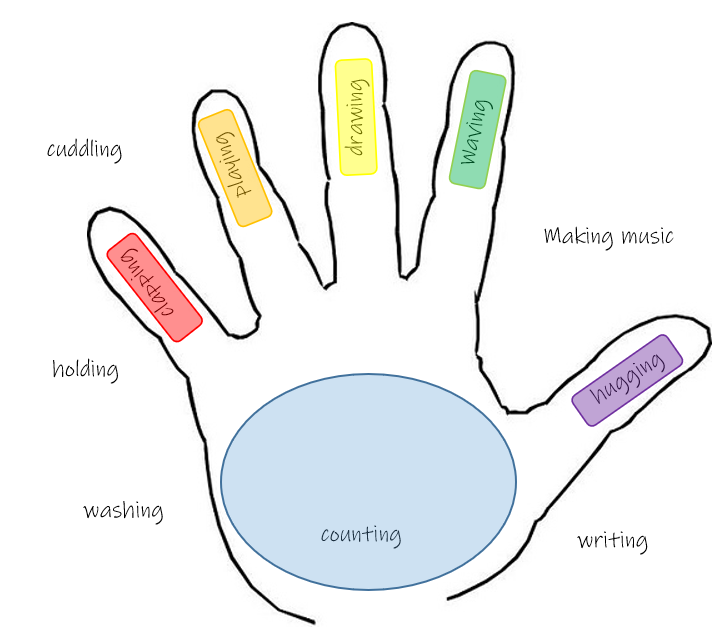DLP'S BIG IDEAS
CARING HANDS
MAIN ACTIVITY
- Draw around your child’s hand. On each finger and around the hand write down ways we can do good things with our hands e.g. waving, clapping, drawing.
- Emphasise that hands should only be used in caring ways, not hurtful ways like hitting. Talk about how you would feel if someone hit or pushed you. Compare this to how you would feel if someone used their hands in a caring way e.g hugging or playing.
- You can then decorate your hand – please see an example below:

IN MY BAG I HAVE PACKED...
MAIN ACTIVITY
- For this activity you need to take it in turns. The first person says, “In my bag I packed a ball.” The second person then says, “In my bag I packed a ball and a doll. Then the first person continues the list, “In my bag I packed a ball, a doll and a car.
- You continue taking turns until someone forgets an item!
HOW CAN WE MAKE THIS ACTIVITY MORE CHALLENGING?
- Use alternative phrases and contexts, such as:“I went to the zoo and I saw a …”“I went to the shop and I bought…”
HOW CAN WE MAKE THIS ACTIVITY EASIER?
- Draw pictures to help you remember.
EMOTIONS CHARADES
MAIN ACTIVITY
- Write the names of different emotions on a piece of paper.
- Take turns picking a slip of paper and then acting out the picture showing the emotion. If your child prefers, you can draw the emotion in the space below, like in the game Pictionary.
EMOTIONS
- Happiness
- Sadness
- Anger
- Confusion
- Frustration
- Pride
- Worried
- Calm
- Relaxed
- Bored
- Jealous
- Scared
- Nervous
- Stuck
- Embarrassed
- Irritated
DISCUSSION POINTS
- Discuss how you would help your friend if they were feeling a negative emotion.
- What would you do if you were feeling a negative emotion?
ENGAGE IN ADULT LED SMALL GROUP GAMES
MAIN ACTIVITY
1. Play a game with your child and one or two of their friends or other family members around the same age e.g. cousins.
2. Choose a board or table top game that the children enjoy. Please see below for suggestions and links to games and activities for specific ages.
3. Praise your child and their friends for good listening, waiting, turn taking and good sportsmanship (e.g. not getting cross if they aren’t winning).
4. Enjoy yourself!
Remember! You can always try the easier games listed for younger children if your child is struggling to participate successfully in age related games.
HOW CAN WE MAKE THIS ACTIVITY MORE CHALLENGING?
· Let the children take more control and take their turn independently.
· Select more difficult games.
· Play with more children.
· Let your child read the rules out to other participants and organise the game.
HOW CAN WE MAKE THIS ACTIVITY EASIER?
Be flexible with the rules of the game e.g. remove more challenging rules, allow time out.
· Select easier games.
· Play 1:1 with your child.

ENGAGE IN ADULT LED SMALL GROUP GAMES
MAIN ACTIVITY
1. Choose an activity, such as cooking or building an object with Lego.
2. Ask your child to choose a role. They could be the ‘Engineer’ who has the equipment and gives the instructions or they could be the ‘Creator’ who follows the instructions. You take the other role.
3. If your child is the ‘Engineer’ they need to give clear verbal instructions and provide the correct equipment.
4. If your child is the ‘Creator’ they need to interpret the instructions and carry them out correctly.
5. If you come up against a problem, give your child time to consider the solution independently. Only offer suggestions if they are really stuck.
6. Swap roles with a different activity.
Remember! You can always try the easier games listed for younger children if your child is struggling to participate successfully in age related games.
HOW CAN WE MAKE THIS ACTIVITY MORE CHALLENGING?
· Choose more complex activities e.g. a Lego build for older children or follow a recipe with longer instructions and more ingredients.
· Get your child to complete the task with a sibling or cousin and minimal adult support.
HOW CAN WE MAKE THIS ACTIVITY EASIER?
Choose easier activities e.g. a Lego/Duplo build for younger children or follow a recipe with less instructions and ingredients.
· Choose a recipe with picture instructions.
· Give your child additional support with their role e.g. repeating instructions, helping them by guiding their hands.

